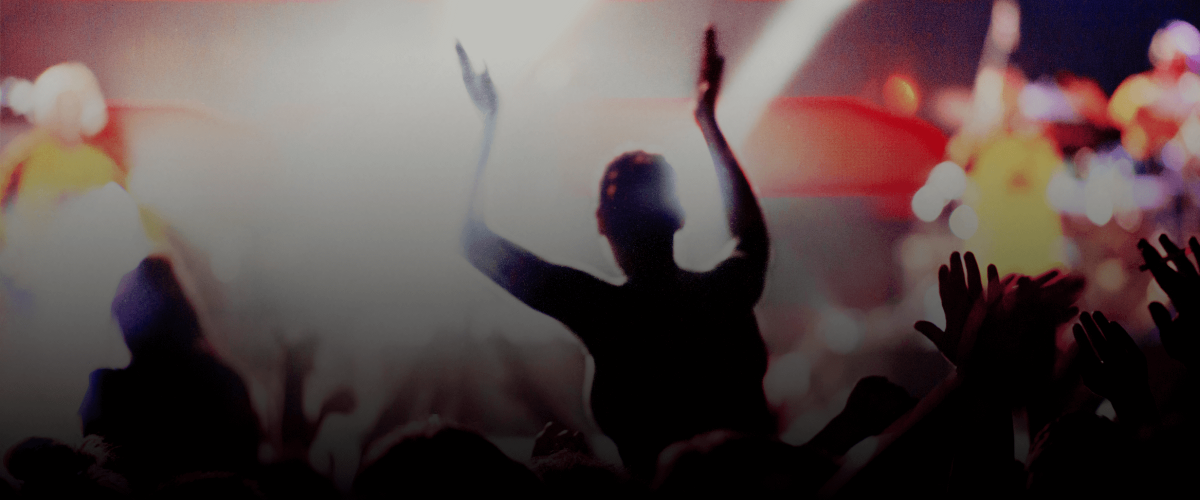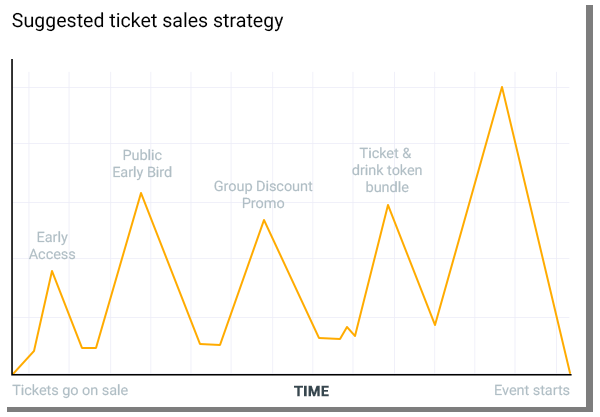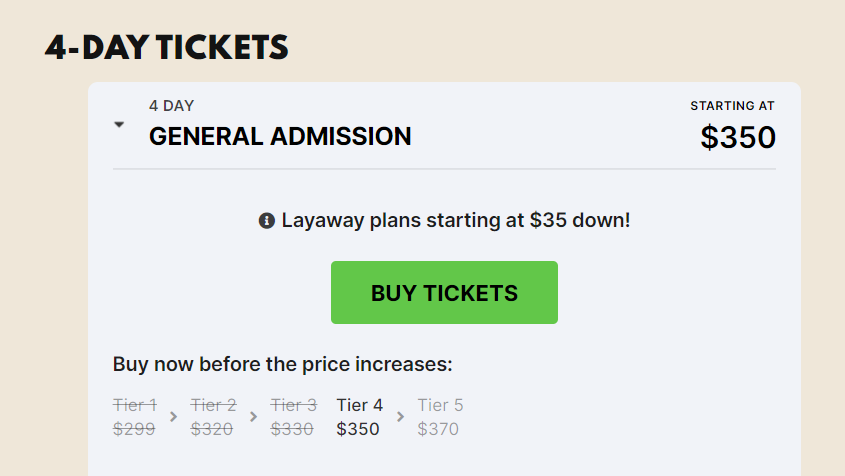The right event ticketing strategy is critical when you want to sell out an event. Live entertainment companies put a lot of thought into their ticketing approach. Their goal is to both sell out the venue while making the best profit margin. Doing both ultimately comes down to analyzing consumer behavior.
Every fan has an “experience” they are looking for within an event. The live entertainment company’s mission is to provide an answer to such needs that appeal to the target audiences. Read TSE’s blog on “Leveraging the Fan Experience” to learn more. Luckily there are numerous strategies to increase the chances of your event selling out. Below are four different strategies that will increase the number of tickets sold.
1. Develop an Event Ticketing Strategy
Developing your event’s ticket pricing strategy is very important to a financially successful event. If the prices are not set correctly, you can have a packed house without making any money or have a low turnout and take a big loss for your live entertainment event.
Ticket prices can be a slippery slope if you are not mindful of your budget and target audiences. Often less experienced live event promoters prioritize getting people to buy their event tickets. They set prices low to appeal to more potential attendees. In a Mckinsey research study, it was concluded that 80-90% of poorly priced products were priced too low (Social Tables, 2021).
Your event ticketing approach will also be affected on how you plan to make money at the live entertainment event. Is ticketing your only source of revenue for the event? Will you make money from food, beverage, and merchandise sales as well as tickets? Many events make their profit from the sale of these items and their goal for ticket sales is to make the funds needed to break even.
That means your first priority in developing an event ticketing strategy is determining your breakeven point. That’s the number of tickets you need to sell at your average net ticket price to pay for all the fixed expenses of the event. For instance, if your breakeven budget is $50,000 and your net average ticket price is 50 dollars, then you will need to sell 1,000 tickets before you start making any money. If the venue capacity is 1,200, then it will be very difficult to make any real profit on ticket sales alone. If the venue capacity is 2,500 then there’s a lot of room for profit at that average net ticket price. Of course, it still depends on your selling a lot more tickets than the breakeven number.
Your breakeven attendance should be conservatively set at a certain percentage of the venue’s capacity or of expected sales. You need to know the number of attendees you can expect given your ticket pricing and marketing budget. A key tactic consists of researching attendance and ticketing pricing for past similar events in the same drawing area.
The next step is deciding your profit goal from ticket sales. Once you have your breakeven budget and profit goals set, you can then set up your ticketing pricing and strategies to optimize ticket sales.
To understand ticket pricing, the live event company needs to research similar events. It’s important to evaluate competitors that are similar in size, location, and see their pricing. If similar live events are selling tickets at a certain price, the event company can set the price in a similar range.
Keep in mind that an expensive event might take longer to sell out, but you will have an event full of engaged attendees. Ticketed free live events might issue tickets quickly, but actual turn out can vary widely on the day of the event. In the mind of a consumer, if you don’t pay for a ticket, you won’t lose anything if you don’t attend.
2. Create Ticketing Tiers and a Sales Approach for Live Events
Entertainment agencies want to appeal to as many fans as possible when creating fan experiences for a live entertainment event. Some fans will want the closest seat for the cheapest price while others want a VIP experience with add-on options. When a concert or festival has a variety of ticket options, it generates more revenue and a more tailored experience for each fan.
Typically, event ticketing sales look like the graph below when there are no ticket tiers. Ticket sales are high when they first go on sale and the two weeks leading up to the event. Between then, ticket sales are slow.
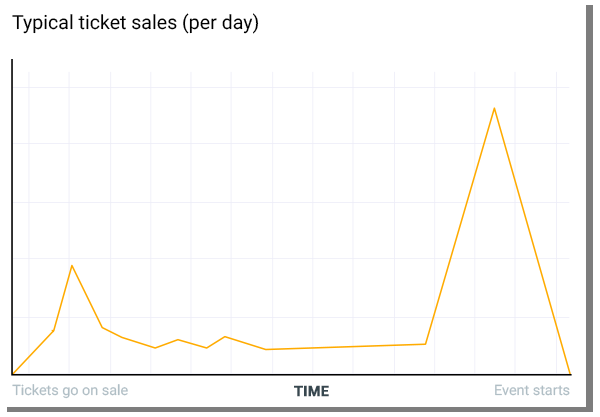
Luckily, there are many techniques ticket companies can employ to keep enticing potential ticket buyers. Ticketing tactics include
-
-
- Early access
- Early-bird specials
- Ticket tiers
- Add-ons
- Group discounts
-
Early Access: Before event tickets go on sale, a live event company with a loyal following might allow early access to their marketing subscribers. Granting presale access will give loyal followers a sense of appreciation and belonging, deepening the business relationship. If the presale tickets sell out, it gives the event company a better picture of what the early bird prices can be set to.
Early Bird Specials: Early bird ticket tiers are in place to reward fans that purchase their tickets early while creating a sense of urgency to get a good deal. There are two strategies to early bird pricing. Ticketing companies can set a “timed” discounted price (never going below your breakeven price). The discount period can last however long, typically a few days to a week.
The second early bird strategy is having a “fixed number” of tickets set for the discounted price. For example, early bird pricing is only available for the first 50 people who purchase a ticket. According to Gilbreth, typically most live event companies will increase ticket prices three times while on sale. This will allow for better accuracy of what fans will pay for future events (Sawyer, 2019).
After the early bird specials are sold out, event companies can create multiple ticket tiers for general admission (GA). For example, there are four GA tiers, and each tier increases in price once the previous tier is sold out.
Ticket Tiers: Below is a view of the Bonnaroo Music Festival ticket tiers. Each GA ticket tier goes up by around $20 per ticket. We no longer see Tier 1-3 because they are sold out. Just like GA ticket tiers, companies can create tiers for VIP and Platinum to create even more pricing and experience options.
Add-Ons: Using add on like VIP ticket sales are a very lucrative course to consider. “In a survey of 1,000 music festival attendees, a third of VIP ticket buyers say the lack of a VIP package influences whether they’d attend the festival at all. Forty-five percent of VIP buyers are willing to spend 50% more than the cost of a GA ticket to upgrade. A little more than a quarter of them are willing to pay double. And about 14% of them are willing to pay more than double the GA price” (Sawyer, 2021).
This data certainly makes the case that having a VIP ticketing option is a great way to enhance revenue at any live entertainment event.
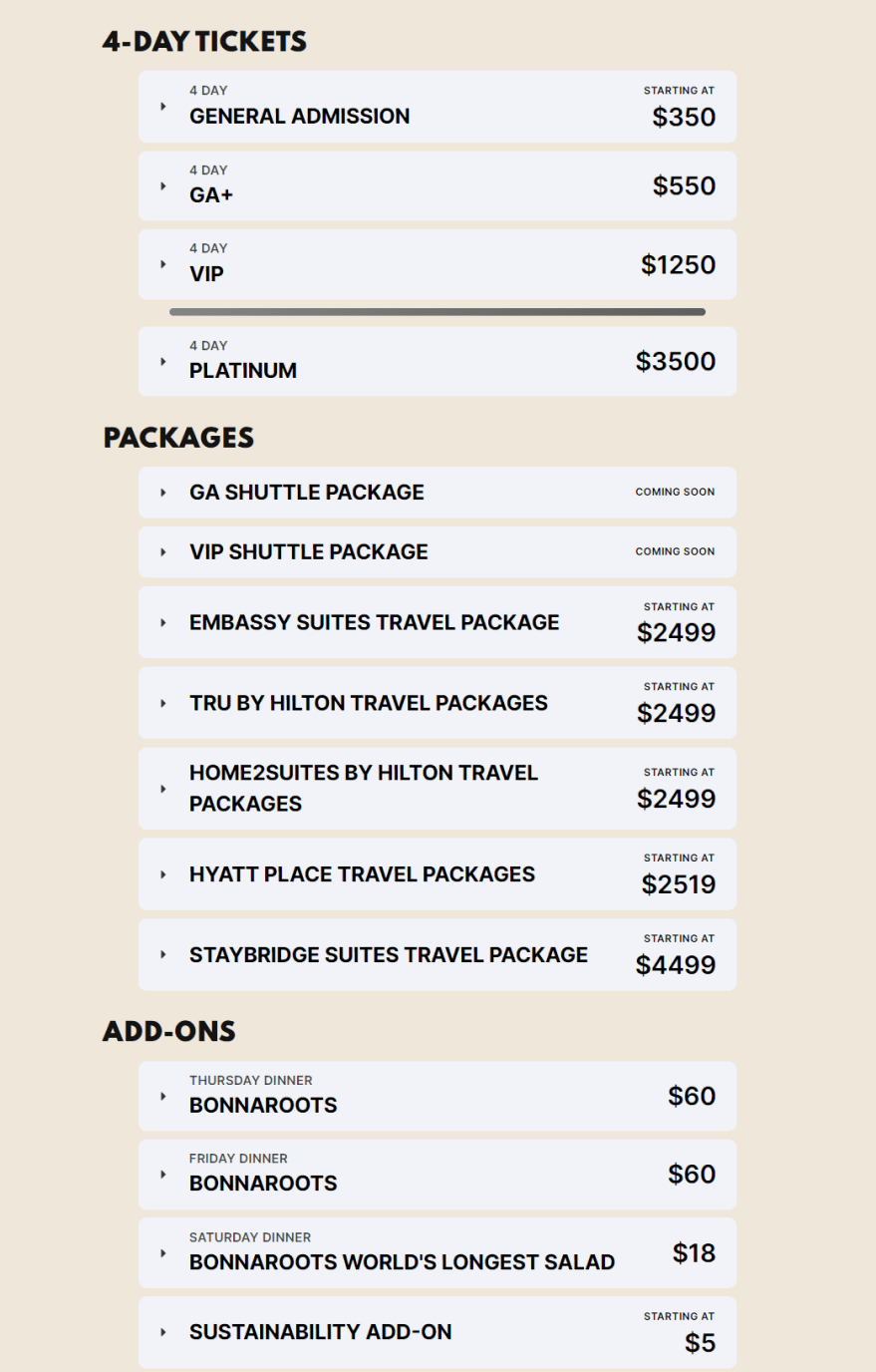
-
-
- Meet and Greet passes
- Shuttle/Transportation passes
- Parking Passes
- Hotel Accommodations
- Drink Tickets
- Food Vouchers
- Merchandise
-
On the day of the event, fans will want to pay at the door or box office. According to Eventbrite, “45% of people who attend a free event will only book for the event on the same day or get tickets at the door. For paid events, only 18% of people will wait to the day of the event. That means people attending free events are two and a half times more likely to book on the day of the event than for paid events” (Walker, 2019). The goal is to have most of the revenue received prior to the event. Venues and events can entice attendees to purchase their tickets in advance by increasing the ticket price significantly on the event day.
Group Discounts: Depending on the event, the use of group discounts for companies, fan clubs or when a certain number of people buy tickets as one package may be appealing to both the event organizer or the organization that would take advantage of such a group discount.
Using various ticketing techniques is beneficial to both attendees and the live event company. These techniques create a sense of excitement and urgency to secure a ticket quickly, increasing the chances of selling out. If you need ticketing assistance or are looking for a new ticketing platform, please visit our ticketing page to learn more about what TSE can provide to you.
3. Create Ticket Scarcity Perception
No one likes the feeling of being left out of a sold-out experience. When consumers feel they may miss out from getting a ticket, FOMO (Fear of Missing Out) starts to kick in. In a survey conducted by a PR firm called Citizen Relations, it was concluded the strategy affects roughly 60% of millennials (Social Tables, 2021). FOMO creates a sense of urgency to buy a ticket, which will lead to more tickets sold.
Scarcity marketing can boost event ticketing sales by 226%. Ticket tiers, as touched on above, are a great scarcity tactic and reward people for buying tickets in advance. Another strategy is displaying a countdown. The countdown could display the amount of time given to complete a transaction before a customer’s cart will expire.
The countdown will push potential attendees to purchase who are still on the fence about going. If they have all the time in the world, they are less likely to purchase in advance. Below is a table representing how long a customer has to purchase an event ticket on popular ticketing platforms.
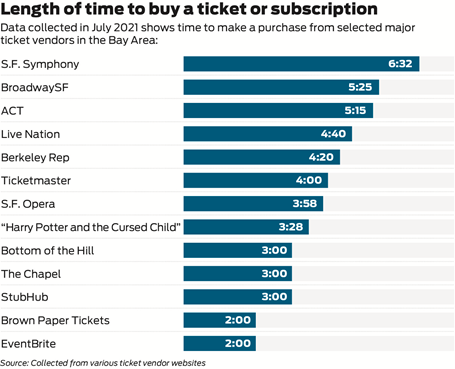
Another countdown tactic event companies can display is the number of tickets sold or tickets left. Depending on where the ticket sale lifecycle is at, companies might display the number of tickets sold only if they have a lot more to sell. Vice versa, a company might display how many tickets are left because there is a very limited supply available. Both countdowns are persuasive depending on the current ticketing sales status.
4. Social Media Ticket Sales Marketing
There is no doubt event marketing increases the chance of an event selling out. Using social media broadens the reach to all types of audiences. Depending on if the performer is up-and-coming or an international rock star, there are many different social channels an event company can utilize to market tickets for their event.
You must understand the target audiences’ demographics and psychographics and which social media platforms can best reach them. For example, if the performer appeals to a niche market, it might be beneficial to research targeted subgroups, such as Reddit and Facebook, as well as using the company’s established social media outlets.
Another important technique to selling more tickets is to create unique images of the event for the performer to repost to their loyal following. By doing so, companies receive a direct path of communication to the target audience with little effort or research. For an artist’s post to be effective, the image must state the needed information for a fan to decide if they will attend. Here is an extensive blog on how to create a poster or image, without leaving out necessities.
When live event companies post about their event on social media, the link will direct customers to the event landing page. The page must be mobile-friendly. According to Statista, in 2020 alone, over 2 billion people purchased a product or service online (Coppola, 2022). Ticketing platforms that do not have a mobile interface may lose potential revenue.
Customers should also be able to see all the information about the event on the landing page. If a company wants to entice a potential customer to attend the event, perhaps add a highlights video of the prior year. Giving a glimpse of the experience can hype up a customer and lead to an instant purchase. Entertainment companies also can add past attendee testimonials to give an attendee’s perspective.
During and after a concert or other live entertainment event, the event producer should interact with fans by reposting some of the content from the show. Companies can also comment and like posts to show appreciation for coming to the show.
If you are looking for assistance with your event marketing, visit our website for more information on how TSE can help grow your event awareness!
